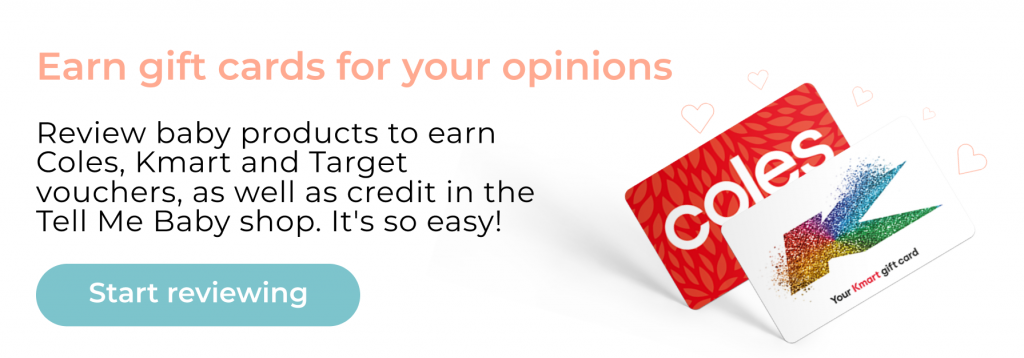Starting solids: 4 common misconceptions

Brought to you by Rafferty’s Garden.
When your child’s ready to start solids, it can be hard to separate fact from fiction while sifting through Google.
In our latest Facebook Live chat, we talked to Dr Kyla, a paediatric dietician and founder of Baby Mealtimes. Dr Kyla says there are some common misconceptions around starting solids, including puree vs baby-led weaning, when to introduce water (and how much), and lots more.
Here’s some great advice to help you and your little one as they’re introduced to the wonderful world of food.

1. Purees vs baby-led weaning
Pureed food verse baby-led weaning might seem like a big decision to make, but the good news is that you can do both (if that’s what you and your baby want).
“Different people would have you believe different things,” says Dr Kyla. “Some people are very strongly in the puree camp, or very strongly in the baby-led weaning camp. And my biggest tip is that you don’t need to choose a side; you can take the benefits of both of them.”
Kyla says she loves purees because it’s easy to add foods that are high in iron to them – which is essential when your baby starts solids.
“The meat, the chicken, the eggs, nuts, seeds, beans and lentils, they aren’t foods that your baby can pick up and eat straight away,” says Dr Kyla. “They take a lot of skill development. So I love in the puree context that you can blend them up and offer them to your baby in a way that they can swallow them.”
On the other hand, while baby-led weaning foods like fruits and vegetables are an excellent way for babies to build confidence, and to learn through touch, smell and taste, they aren’t a great source of iron.
“Using [baby-led weaning] as a learning skill and then using your high iron foods in puree is the best of both worlds,” says Kyla.
Parents in the Tell Me Baby community love Rafferty’s Garden Rice Cereal, Pear, Banana & Milk 4m+. Read Rafferty’s Garden reviews.

2. Milk or food first?
Knowing when to feed baby food and when to feed baby milk can be overwhelming for parents.
“You always want to be offering milk first at the start,” says Dr Kyla. “And I recommend until about eight months to keep with milk first, mostly because milk still provides the majority of nutrition at this age.”
“If we don’t offer milk first, we run the risk that we put our baby in the high chair, and they don’t understand the point of food. And they’re so frustrated because they’re starving and this food isn’t helping. Or they go the other way, and they eat so much that we reduce their appetite for milk – and we don’t want to reduce milk feeds in those first few months of solids.
“So I would always offer breast milk or formula first, and then my general recommendation is solids within an hour of that.”
Watch the full interview with Dr Kyla below.
3. Rice cereal
Another common starting-solid topic that has a lot of conflicting information around it is rice cereal.
Rice cereal is something that was traditionally used as part of puree. It was ground down rice with added iron, made with water, breast milk or formula.
Dr Kyla says, “One concern is that rice naturally contains arsenic – it’s just the way that it’s grown, the way that the plant is, so when you use rice cereal, they’re going to be trace amounts of it in there as well.
“If you’re putting like a tablespoon of rice cereal into puree to add a bit of iron, we’re not worried about arsenic poisoning. If you are feeding your baby, you know, kilograms of rice in a day, then sure, I would probably say we need to dial back on that.
“But realistically, in the scheme of things, I’m not worried about including that amount of rice cereal.”
Another thing people are concerned about is that rice doesn’t have enough nutrients, but Dr Kyla says “that is not true.”
“It is literally just ground down rice that has added iron. And if you’re offering your baby something like a pumpkin puree, you can put a little bit of rice cereal into it to add that iron content,” she says.
“Having said that, if you feel strongly and you don’t want to offer rice cereal, that’s okay too. You just need to offer other iron sources.”
4. Water
Water is another area where it’s common to find misinformation.
“Babies don’t need water for hydration,” says Dr Kyla. “That’s probably one of the big things to remember.
“The main reason is that water has no nutritional content. It doesn’t help with growth as breastmilk or formula does, or as food does.”
The other reason is that babies under 12 months get all of their hydration from formula or breast milk – so Dr Kyla says she likes to use it as a “learning experience”.
“You can introduce your baby to water from the start of solids so that they can practice drinking, but the amount that we want at the very start is a maximum of 30 to 60 mls a day. That’s like a shot glass.”



